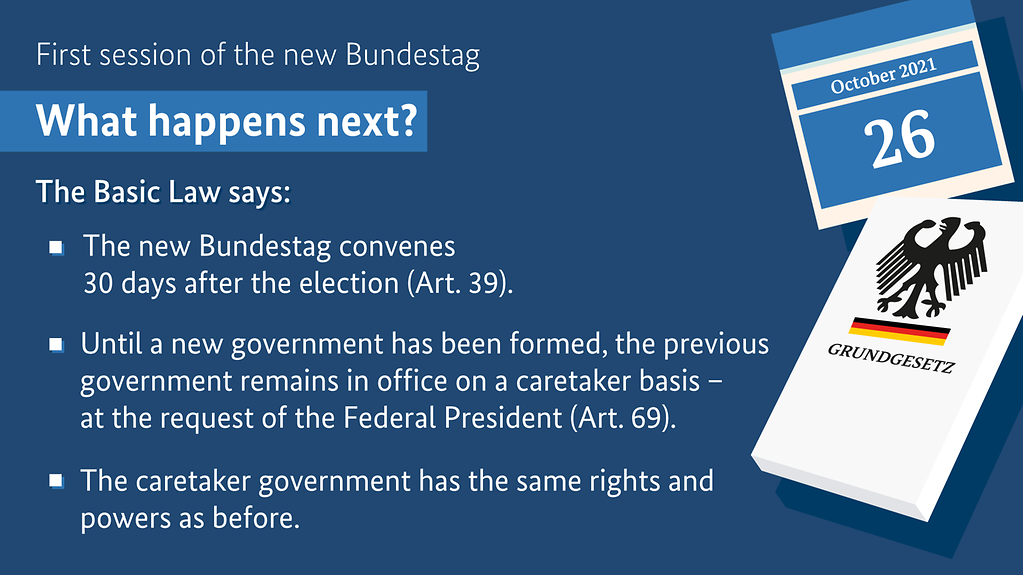First session of the new Bundestag
Federal President Steinmeier presented Federal Chancellor Merkel and the ministers of the Federal Government with their certificates of discharge, while also requesting them to continue in office until a new government is formed. This formal procedure is set out in the Basic Law.
2 min reading time

Federal President Frank-Walter Steinmeier presents Federal Chancellor Angela Merkel with the certificate of discharge.
Photo: Federal Government/Bergmann
“A chancellorship that can be counted among the greatest in the history of this republic”: in his speech discharging the Federal Chancellor and members of the Cabinet, Federal President Frank-Walter Steinmeier thanked them for their “services to democracy”. The ceremony at Bellevue Palace in Berlin then continued with the Federal President presenting the certificates of discharge.
When the Federal Government’s term of office comes to an end, the inaugural session of the new Bundestag is held. This took place in the morning – 30 days after the national elections, as stipulated in Articles 39 and 69 of the Basic Law. Since Federal Chancellor Merkel is not a member of the new Bundestag, she followed the inaugural session of the parliament from the guest gallery.
Election of the Federal Chancellor and formation of government
The 20th Bundestag will soon elect a new Federal Chancellor. According to Article 63 of the Basic Law, this is done at the proposal of the Federal President. The election requires the so-called “chancellor majority”, i.e. more than half of the votes of Bundestag members.
In order to achieve such a majority, it is possible for several parties to join together in a coalition. Very often, the negotiations required for this purpose will not yet have been concluded by the time the inaugural session of the Bundestag is held. This is indeed the case with what is now the 20th Bundestag: the Federal Chancellor is no longer in office, but no successor has been elected yet.
Caretaker government
In this situation, the Basic Law stipulates that the Federal Chancellor, at the request of the Federal President, is to remain in office in a caretaker capacity until a successor is appointed. The Federal President addressed a request to this effect to the Federal Chancellor on Tuesday. The members of the Federal Cabinet are also obliged to continue to conduct business at the request of the Federal Chancellor or the Federal President. In this way, the composition of the former Federal Government is maintained after the start of business until the new Federal Chancellor has been elected.

After the national elections, the incumbent Federal Government retains its full authority.
First session of the new Bundestag
What happens next?
The Basic Law says:
- The new Bundestag convenes 30 days after the election (Art. 39).
- Until a new government has been formed, the previous government remains in office on a caretaker basis – at the request of the Federal President (Art. 69).
- The caretaker government has the same rights and powers as before.
Photo: Federal Government
A caretaker government has the same powers as a “normal” government in office. However, it has been standard practice to date for such a government not to make far-reaching decisions that would bind a subsequent government. This concerns issues involving major financial or personnel decisions, as well as the adoption of draft laws. The Federal Government retains its full authority until a new government has been formed.
The inaugural session of a Bundestag also involves the election of the parliamentary president, whereby the party with the most members of parliament has the right of nomination. On Tuesday, SPD member Bärbel Bas was elected President of the Bundestag by a parliamentary majority.